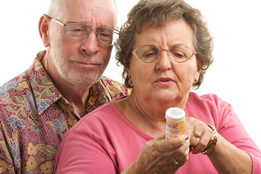 Most of us have grown up with the faith that when we have a medical issue, there is likely to be a drug to take to alleviate the problem. Yet, we as geriatric care managers have found that more than 700,000 hospitalizations each year result from adverse events or side effects of drugs or because patients are over-medicated. Most of these patients are older adults, despite the fact that those over age 65 years of age represent only about 13.5 percent of the population. If you are a caregiver to an older adult or other person with special needs, you should pay particular attention to the following to keep your loved one out of the hospital:
Most of us have grown up with the faith that when we have a medical issue, there is likely to be a drug to take to alleviate the problem. Yet, we as geriatric care managers have found that more than 700,000 hospitalizations each year result from adverse events or side effects of drugs or because patients are over-medicated. Most of these patients are older adults, despite the fact that those over age 65 years of age represent only about 13.5 percent of the population. If you are a caregiver to an older adult or other person with special needs, you should pay particular attention to the following to keep your loved one out of the hospital:
- It is not just prescription drugs that should concern you. Most of the medicines that we all purchase over the counter (OTC) were once prescription medicines. They can represent potentially harmful side effects like Tylenol with its potential for liver toxicity. And don’t forget that even aspirin is an acid; but it was on the drug store shelf before there was an FDA to protect us from its stomach slide effects.
- Keep track of all the medicines your elder may be taking (and include the OTC meds). Most doctors’ offices are getting very good about asking what medicines are being taken with each visit, but be prepared with your loved one’s lists at each visit. And ask if any can be dropped; you may be surprised at how many prescriptions handle the side effect of another medication.
- Be careful about how a medication is to be taken. Make sure your older loved one and you both understand the time of day a drug is to be taken, with or without food or how it might interact with another medication or even certain foods.
- Read the fine print. Every prescription has something pharmacists call the package insert or PI. Read the indications and usage section of this long page and call your provider with any questions. Also read the adverse events to make note of anything that has a greater than 5% incidence – and what steps to take should that event happen.
- Make sure you watch for anything out of the ordinary and ask your loved one how they feel. It may be just a dry mouth, or it may be hard stools or other side effects they may not volunteer. Everything is important to monitor. And if your loved one suddenly has any difficulty breathing or feels anxious, call your provider.
Underlying all of these caveats, appreciate that your older loved one has less fluid per pound than a younger adult. Their metabolisms also function more slowly. And most drug trials are conducted only with younger and healthier adults, so side effects may be minimal and less consequential. Birthdays and drugs may have bigger side effects than the pharmaceutical companies may have found in their trials.
Charlotte Bishop is founder of Creative Care Management, a team of geriatric care managers, certified professionals, advocates, resources, counselors and friends to older adults and their families in metropolitan Chicago. Please email your questions to info@creativecasemanagement.com.



